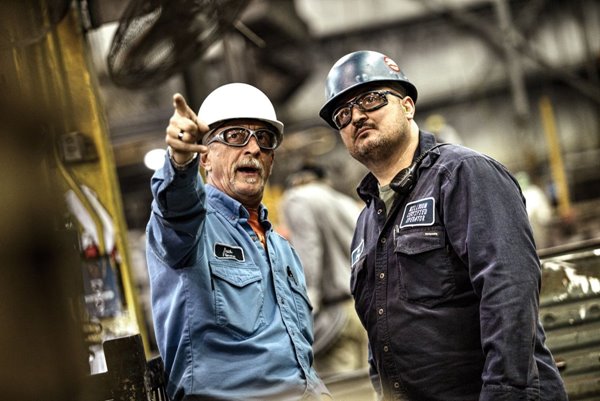China, Tariffs, Tech Skills, Metaverse, And More: Predictions For The Manufacturing Industry In 2025
Ethan Karp | Forbes Magazine
For manufacturers, 2024 was another rollercoaster year. The industry took cover under the threat of a slowing economy and kept an eye on geopolitical uncertainty. It waited for the results of an election that felt particularly impactful to manufacturers, then sized up how the new administration may impact the industry’s future.
As we greet 2025, more uncertainty seems inevitable between the looming effects of tariffs and an economy that still can’t make up its mind. As always, the manufacturers who study the market and move quickly to smartly invest in people and machines will find themselves with a leg up. Let’s take a look at a few predictions for the coming year.
1. U.S. Reliance On China Will Continue To Rebalance, With Or Without Tariffs
Over the last few years, a pandemic, war, and geopolitical unrest has exposed the cracks in our supply chain. One glaring weakness: U.S. over-reliance on China.
Change doesn’t happen overnight, but I see 2025 bringing more committed efforts to rebalance against that inherent risk. American manufacturers will spread their operations to new geographies, and a good portion will choose to reshore or nearshore (primarily to Mexico), each bringing its own benefits.
Of course, the Trump administration’s planned tariffs against China will be a key factor in the equation. The impact of the proposed tariffs is nuanced—but the long-term hope is that they induce deeper investments in high-tech, automated facilities here in the U.S. Those investments are vital to the U.S., and manufacturers here should be making them to protect their future—with or without tariffs.
The U.S. has a long way to go to catch China, but even as the world’s number two, there is incredible economic value in building up manufacturing. Expect advanced manufacturing hubs in places like Ohio, Texas, and Arizona to expand rapidly, becoming leaders in semiconductor production and other critical industries—and, along the way, redefining the future of American manufacturing.
2. Tech Skills Will Become The New Trade Skills.
The impact of robotics and automation has arrived—and it’s pressing workers into a new environment where tech skills are every bit as critical as trade skills.
For all the talk, the truth about robots is not that they’ll replace humans, but that they’ll rejigger the ways they must work and the skills they need. In fact, it’s already happening today, and manufacturers can’t afford to be passive in this evolution.
In an industry already strapped for talent—expected to be short 1.9 million workers by 2034—manufacturers must actively evolve their workforces. They must set a clear and transparent path forward, have open conversations with employees about the skills they will need to remain valuable to the company, and offer training and upskilling opportunities to address deficiencies. On the latter point, public-private partnerships will become a bigger part of how manufacturers help workers gain technical skills.
3. Sustainability Will Drive Innovation, And The EV Market Will Shift
Manufacturers for a long time considered sustainability a cost center. Today, it’s an opportunity. When MAGNET, the nonprofit manufacturing consultancy I run, surveyed manufacturers in Northeast Ohio, we found that sustainability was the single greatest driver of innovation, changing both what manufacturers make and how they make it.
Manufacturers are taking a wide range of approaches to the topic. Some have engaged in shifting their supply chain to use more recycled materials or bring suppliers closer to home. Others have implemented circular production models, reused parts, minimized waste wherever possible, and reduced energy consumption.
EVs are the most obvious illustrator of the value of sustainable thinking, and they come with incredible opportunity that extends far outside the realm of automakers. Companies are racing to build EV components, develop battery technology, and establish the infrastructure needed to support electric fleets.
One thing to look out for: The Trump Administration may be planning to ax the $7,500 EV tax credit and cut funding currently used to create charging stations, Reuters reports. Both could stall the transition to EVs in the short term and devastate some EV makers. Tesla, however, has said it supports ending the credits, believing it’s better prepared to handle such a change than its competitors.
4. The Industrial Metaverse Will Take Off
The over-promised hype of the consumer metaverse, precipitated by big tech, may have done some damage to the public perception of the term. But make no mistake: Inside manufacturing, the metaverse is alive, well, and ready to take a step forward in 2025.
This industrial metaverse, as it’s known, refers to the web of advanced technologies like digital twin, IoT, AI, and virtual reality that come together to create immersive, real-time replications of industrial processes. These simulations can help manufacturers predict machine failures, fast-track prototypes, or better understand and solve for process deficiencies. And, connected to the industrial metaverse, manufacturers can design, manage, and optimize their operations virtually.
It will be incredibly powerful not only as we build the manufacturers of the future, but also as we stitch them together into one collaborative and efficient supply chain. Through live data streams, manufacturers can gain a better sense of the operations at other suppliers and vendors along the supply chain, meaning they can better react to supply and demand, improve efficiency, and spur innovation.
In other words, it’s exactly in line with the sort of changes manufacturers should be pursuing in 2025. As companies work through economic uncertainty and prep for the new administration to impact their worlds one way or another, they should also be aggressively pursuing technology investments (including to the tech-savviness of their workforce), looking into the viability of reshoring or nearshoring, and sizing up the sustainability opportunity.

